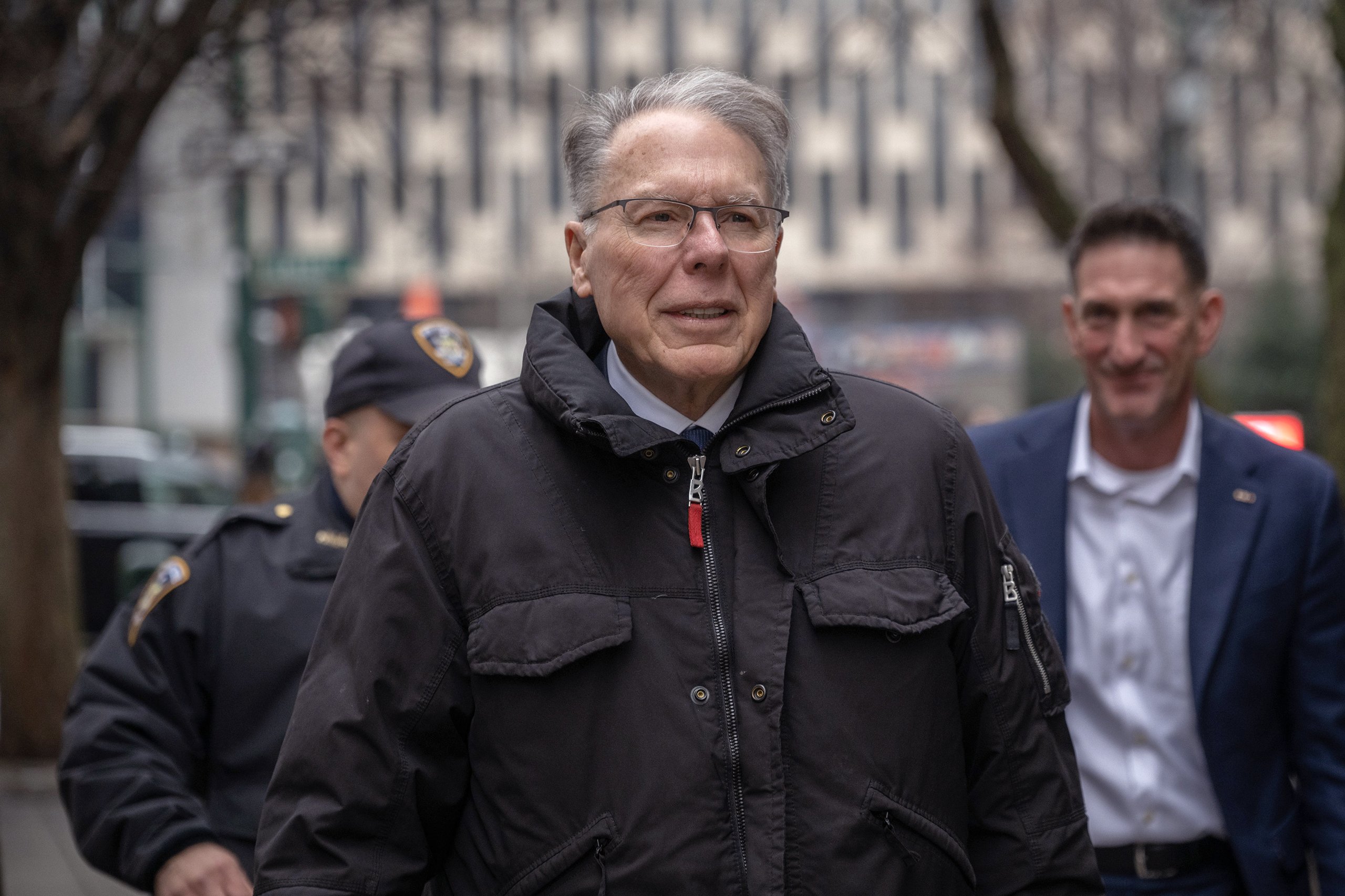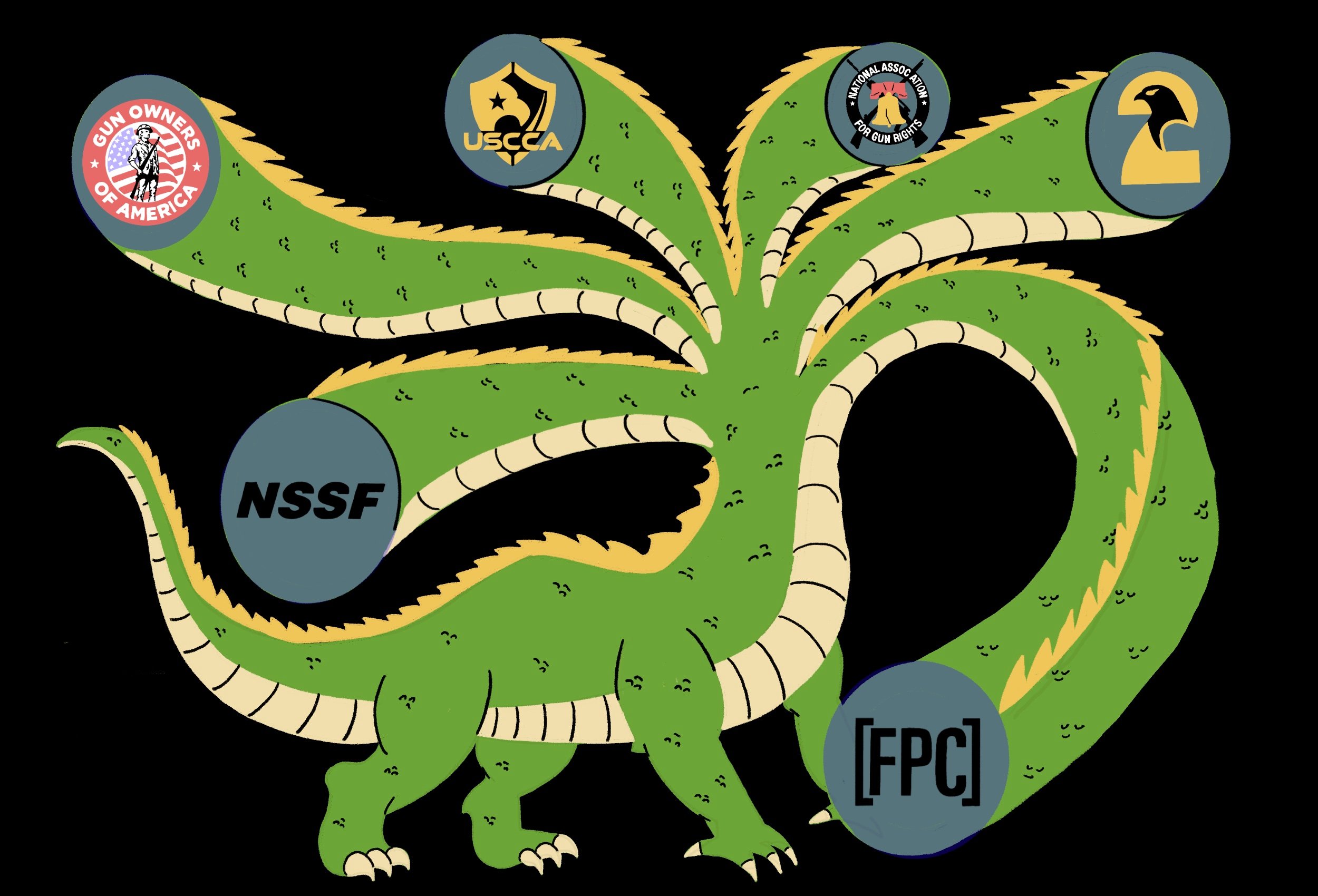A jury has found the National Rifle Association and its recently departed CEO, Wayne LaPierre, liable in a civil corruption case brought by New York Attorney General Letitia James. Jurors ordered LaPierre to pay the gun group more than $4.3 million in damages.
Although LaPierre announced his resignation three days before the trial began in Manhattan, James continued to pursue his ouster, and the jury agreed that the evidence warranted his removal. LaPierre was impassive as the verdict was read.
Wilson Phillips, a longtime NRA treasurer who left the organization in 2018, and John Frazer, the gun group’s general counsel, were also found liable for failing to be faithful stewards of NRA assets. The jury ordered Phillips to pay the organization $2 million in damages. However, the jury found no monetary liability on Frazer’s part, and no cause to remove him from his post, an outcome sought by the attorney general.
The verdict comes nearly five years after an investigation by The Trace revealed that a small group of NRA insiders and vendors had extracted millions of dollars from the group’s budget through gratuitous payments, sweetheart deals, and opaque financial arrangements. James drew on those findings in her suit against the group.
“This verdict is a major victory for the people of New York and our efforts to stop the corruption and greed at the NRA,” James said in a statement. “LaPierre and senior leaders at the NRA blatantly abused their positions and broke the law.”
During his testimony, LaPierre admitted to having mishandled NRA funds. He acknowledged having benefited from travel and expense arrangements — including some in place for decades — that defrauded the organization. In closing arguments on February 15, LaPierre’s attorney, Kent Correll, described his client as a “genius” of politics and marketing who was “focused on the big picture,” not spending details. Correll granted that LaPierre had blundered, but said his client tried to fix errors when he learned of them. “His business judgment was good on the big things,” Correll said. “His judgment failed him on some of the little things.”
Repeating a line advanced by all the defendants, Correll attacked the attorney general’s motives, telling jurors that the state had “concocted this story of greed and selfishness” to eliminate what her office considered a hostile political adversary. “The fact is that Letitia James set out to destroy the organization,” Correll said, “and she knew that the best way to do that was to destroy Wayne LaPierre.”
During the trial, the NRA sought to distance itself from LaPierre, going so far as to include his resignation in a list of the organization’s “clear corrective actions.” Sarah Rogers, one of the NRA’s attorneys, portrayed the gun group as the true victim in the case. “Misconduct against the NRA is not misconduct by the NRA,” she told jurors.
The group tried to minimize the attorney general’s claims. What the state described as fraudulent and misleading IRS filings, Rogers called “some inconsistencies in tax returns.” Acts of whistleblower retaliation were merely mean social media posts. “These are fiery, opinionated gun rights advocates,” Rogers said. “Sometimes they don’t agree.”
Another central theme of the defense was that the NRA had cleaned up its act. LaPierre, Phillips, and other miscreants are gone, Rogers noted in closing arguments, and since 2018, when a group of NRA employees raised alarms about a range of financial abuses, the gun group moved aggressively to identify violators and bolster internal controls, putting the organization’s welfare above that of any individual. “It dug in,” Rogers said of the NRA. “It turned over even the rocks it was told not to touch.”
Among those who blew the whistle on misconduct in 2018 were finance specialists who remain employed at the NRA. They testified to compliance becoming a “way of life” at the gun group. However, lawyers for the state argued that the changes were inadequate and spurred by fear of New York regulators, not an earnest intent to do better. And during the six-week trial, the state presented evidence of abuses that occurred well after 2018.
For instance, from 2012 to 2021, the NRA paid a vendor — on whose yacht LaPierre and his family took trips — $45 million more than was authorized by contracts, according to an accountant hired by the attorney general. Roughly a third of that amount was paid out after 2018. LaPierre signed off on those overpayments. He did not divulge the yacht trips on internal financial disclosure forms until the day he was scheduled to testify in a Texas courthouse during the NRA’s failed 2021 bankruptcy. A renegotiation of the contracts in 2022 resulted in a 46 percent savings to the NRA, the accountant found.
In her closing argument, Assistant Attorney General Monica Connell described how the NRA hired a new treasurer in 2018 to replace Phillips and improve governance. He did so and was rewarded, she said. In April 2020, the NRA gave the new treasurer, Craig Spray, an employment agreement that promised 18 months of severance pay if he was let go without cause. He later got a $250,000 bonus.
Then, in November 2020, Spray declined to sign the organization’s annual IRS return because he was unsure how certain dollar figures had been determined. Shortly after the NRA filed for bankruptcy in January 2021, Spray expressed criticism of the move to LaPierre. LaPierre fired Spray two days later, Connell said. “He was making the NRA do its job,” Connell told jurors, “but as soon as his reforms came too close to leadership, his days were numbered.”
LaPierre authorized the bankruptcy in secrecy. A judge dismissed the claim in May 2021, finding that the NRA had no good faith reason for filing its petition and had sought to gain an improper advantage over James. During the NRA’s corruption trial, Connell pointed jurors to a specific portion of the bankruptcy decision, where the judge had said that his top concern was “the surreptitious manner in which Mr. LaPierre obtained and exercised authority to file for bankruptcy.” The judge added: “Excluding so many people from the process of deciding to file for bankruptcy, including the vast majority of the board of directors, the chief financial officer, and the general counsel is nothing less than shocking.” Connell told jurors that LaPierre’s bankruptcy ploy, coming years after the group’s claimed course correction, was the “ultimate override” of internal controls.
That only a small circle of insiders had direct knowledge of LaPierre’s actions did not absolve the NRA, the state argued. In contrast to the NRA’s position, Connell stressed that there was no daylight between the group and LaPierre. “A corporation acts through its people,” she told jurors. “Key board members helped and covered for LaPierre.”
As The Trace recently reported, Phillips, the long-serving treasurer who left the NRA in 2018, helped LaPierre and other executives hide lavish personal expenditures. Private jet travel, luxury hotel stays, limousine service, and pricey meals were charged to credit cards given out by the NRA’s longtime public relations firm, Ackerman McQueen. Ackerman then submitted vague invoices back to the NRA for the costs. Only a select group within the NRA was aware of the arrangement, which cost the gun group $4.3 million from 2015 to 2019, according to the attorney general’s hired accountant. When Phillips left the NRA, the group gave him a post-employment consulting gig that paid $30,000 a month. The attorney general said no actual consulting was done, however.
Phillips’s attorney, Seth Farber, said in closing arguments that his client’s actions were breaches of protocol, not illegal acts done with intent to harm the NRA. “There’s a huge difference between violating an NRA policy and violating the law,” he said.
Perhaps the state’s trickiest case was against Frazer, the NRA’s general counsel. No evidence suggested that he’d improperly enriched himself. His attorney, William Fleming, described how Frazer had moved to boost financial oversight and said he’d been “supportive” of whistleblowers, all of which was backed-up by witness testimony. “John Frazer is the walking embodiment of good faith,” Fleming said. “He does things the right way, and always has. That’s what makes these charges so unfair.”
Though the jury found that Frazer should keep his job and not have to pay damages, it did find him liable for having “made or authorized” false financial filings to the state.
Connell, the assistant attorney general, told jurors that Frazer was a “kind man” who “worked hard,” but he was inexperienced and too meek. “Time after time, the evidence has shown he had the opportunity to step up, to speak up, to stop illegal conduct, to stop conduct in violation of the NRA’s policies, and he largely failed to do so,” she said.
The jury also found that the NRA had retaliated against employees who had voiced concern about financial abuses, made false financial filings to the state, and allowed insiders to improperly benefit from the gun group’s cash. The NRA paid board members for consulting and speaking services and covered hair and make-up costs for LaPierre’s wife, Susan LaPierre. For these actions — and the group’s broader oversight failures — James wants the NRA under the eye of a monitor and a governance expert appointed to advise the court on reforms. Judge Joel M. Cohen will rule on these requests at a yet-to-be scheduled second phase of the trial.
Under LaPierre, who joined the NRA as a lobbyist in 1977 and became CEO in 1991, the organization became a political dynamo, credited with swinging the results of federal elections, including those for the presidency. The group successfully lobbied for the adoption of stand-your-ground and permitless carry laws, which a majority of states have enacted. And as it backed landmark Supreme Court cases that vastly expanded gun rights, the NRA became a culture war fixture.
But since 2019, when The Trace and other news organizations revealed the gross misuse of NRA assets by top officials, spurring James to investigate, the gun group has seen its clout diminish. It has spent far less on political activities and core programs, and membership and revenue have fallen dramatically.
Our NRA reporting creates accountability.
Please donate now to sustain The Trace’s nonprofit journalism.
The NRA typically enjoys a fundraising edge during a presidential election year with a Democrat in the White House. However, drained by legal fees and without LaPierre, the man largely responsible for the NRA’s fundraising might, the organization will likely struggle to achieve past political spending levels in 2024.
And more legal jeopardy is ahead. In April, a lawsuit brought by the attorney general’s office in Washington, D.C. — alleging that the NRA illegally siphoned millions of dollars from its charitable foundation — is slated for trial.


